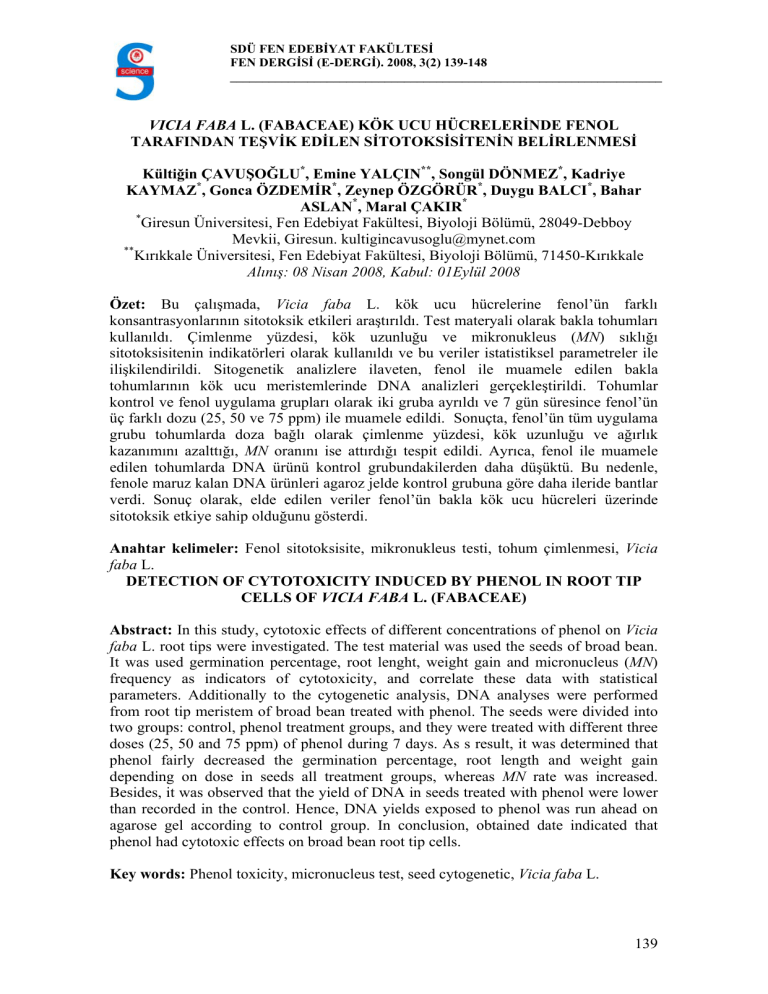
SDÜ FEN EDEBİYAT FAKÜLTESİ
FEN DERGİSİ (E-DERGİ). 2008, 3(2) 139-148
___________________________________________________________________
VICIA FABA L. (FABACEAE) KÖK UCU HÜCRELERİNDE FENOL
TARAFINDAN TEŞVİK EDİLEN SİTOTOKSİSİTENİN BELİRLENMESİ
Kültiğin ÇAVUŞOĞLU*, Emine YALÇIN**, Songül DÖNMEZ*, Kadriye
KAYMAZ*, Gonca ÖZDEMİR*, Zeynep ÖZGÖRÜR*, Duygu BALCI*, Bahar
ASLAN*, Maral ÇAKIR*
*
Giresun Üniversitesi, Fen Edebiyat Fakültesi, Biyoloji Bölümü, 28049-Debboy
Mevkii, Giresun. [email protected]
**
Kırıkkale Üniversitesi, Fen Edebiyat Fakültesi, Biyoloji Bölümü, 71450-Kırıkkale
Alınış: 08 Nisan 2008, Kabul: 01Eylül 2008
Özet: Bu çalışmada, Vicia faba L. kök ucu hücrelerine fenol’ün farklı
konsantrasyonlarının sitotoksik etkileri araştırıldı. Test materyali olarak bakla tohumları
kullanıldı. Çimlenme yüzdesi, kök uzunluğu ve mikronukleus (MN) sıklığı
sitotoksisitenin indikatörleri olarak kullanıldı ve bu veriler istatistiksel parametreler ile
ilişkilendirildi. Sitogenetik analizlere ilaveten, fenol ile muamele edilen bakla
tohumlarının kök ucu meristemlerinde DNA analizleri gerçekleştirildi. Tohumlar
kontrol ve fenol uygulama grupları olarak iki gruba ayrıldı ve 7 gün süresince fenol’ün
üç farklı dozu (25, 50 ve 75 ppm) ile muamele edildi. Sonuçta, fenol’ün tüm uygulama
grubu tohumlarda doza bağlı olarak çimlenme yüzdesi, kök uzunluğu ve ağırlık
kazanımını azalttığı, MN oranını ise attırdığı tespit edildi. Ayrıca, fenol ile muamele
edilen tohumlarda DNA ürünü kontrol grubundakilerden daha düşüktü. Bu nedenle,
fenole maruz kalan DNA ürünleri agaroz jelde kontrol grubuna göre daha ileride bantlar
verdi. Sonuç olarak, elde edilen veriler fenol’ün bakla kök ucu hücreleri üzerinde
sitotoksik etkiye sahip olduğunu gösterdi.
Anahtar kelimeler: Fenol sitotoksisite, mikronukleus testi, tohum çimlenmesi, Vicia
faba L.
DETECTION OF CYTOTOXICITY INDUCED BY PHENOL IN ROOT TIP
CELLS OF VICIA FABA L. (FABACEAE)
Abstract: In this study, cytotoxic effects of different concentrations of phenol on Vicia
faba L. root tips were investigated. The test material was used the seeds of broad bean.
It was used germination percentage, root lenght, weight gain and micronucleus (MN)
frequency as indicators of cytotoxicity, and correlate these data with statistical
parameters. Additionally to the cytogenetic analysis, DNA analyses were performed
from root tip meristem of broad bean treated with phenol. The seeds were divided into
two groups: control, phenol treatment groups, and they were treated with different three
doses (25, 50 and 75 ppm) of phenol during 7 days. As s result, it was determined that
phenol fairly decreased the germination percentage, root length and weight gain
depending on dose in seeds all treatment groups, whereas MN rate was increased.
Besides, it was observed that the yield of DNA in seeds treated with phenol were lower
than recorded in the control. Hence, DNA yields exposed to phenol was run ahead on
agarose gel according to control group. In conclusion, obtained date indicated that
phenol had cytotoxic effects on broad bean root tip cells.
Key words: Phenol toxicity, micronucleus test, seed cytogenetic, Vicia faba L.
139
